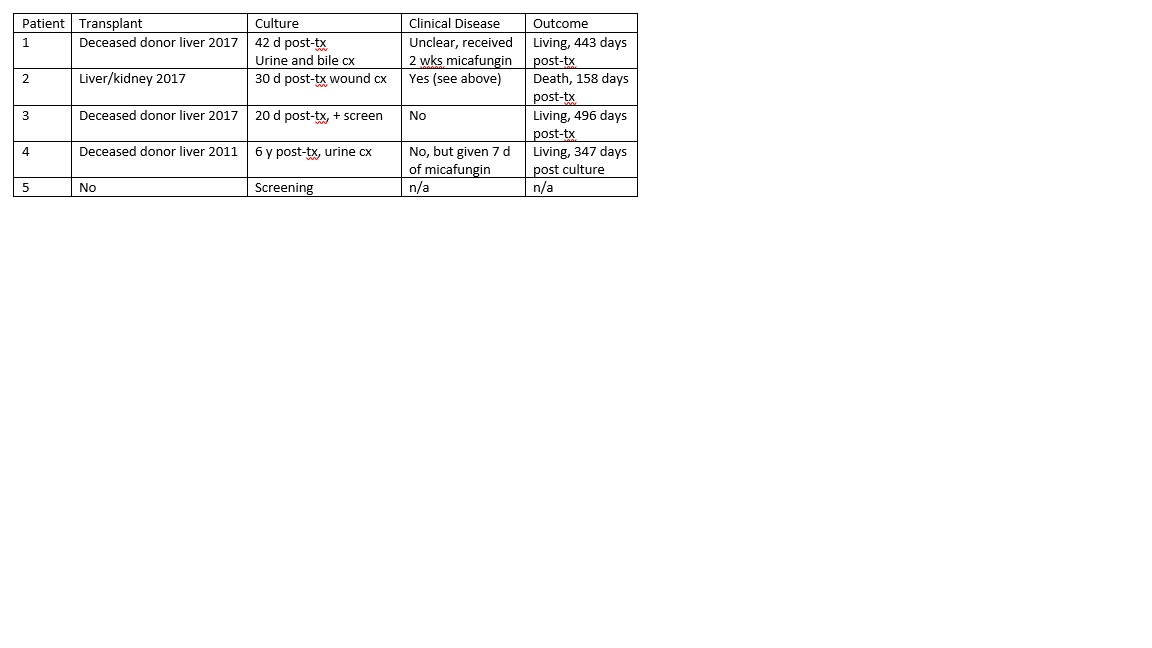Candida auris after Liver Transplant
University of Massachusetts Medical School, Worcester, MA
Meeting: 2019 American Transplant Congress
Abstract number: A340
Keywords: Fungal infection, Liver
Session Information
Session Name: Poster Session A: Transplant Infectious Diseases
Session Type: Poster Session
Date: Saturday, June 1, 2019
Session Time: 5:30pm-7:30pm
 Presentation Time: 5:30pm-7:30pm
Presentation Time: 5:30pm-7:30pm
Location: Hall C & D
*Purpose: C. auris is a difficult to eradicate yeast that has caused outbreaks in hospitals in recent years. We report a cluster of liver transplant (tx) recipients in one intensive care unit who were colonized or infected in 2017.
*Methods: A retrospective review was performed.
*Results: Patients 1 and 2 had cultures that grew C. auris within 3 days of each other in June 2017. Both received deceased donor liver transplants (1 liver-kidney) with post-tx complications including need for hemodialysis, recurrent bacterial infections and prolonged ICU stay. Both patients received ~ 30 days of fluconazole prophylaxis post-tx. Once the first isolate was identified as C. auris, the CDC and state Dept of Public Health were notified and contact precautions were initiated. Screening cultures identified 2 other patients (Pt 3 and a non-tx patient) with C. auris. Pt 4 was identified by clinical culture. All isolates were fluconazole resistant but susceptible to echinocandins. Investigation showed the strains were similar to NY/NJ strains although no source or contact was found. Genotypic matching confirmed clonality suggesting in-hospital transmission. The initial wound culture on Pt 2 was felt to represent colonization so was not treated. Readmission ~3 months post-tx with AKI requiring HD and urine culture with C. auris. At that time the pt had hydronephrosis requiring nephrostomy and was found to have a pseudoaneurysm at renal graft anastomosis to R ext iliac artery. She had allograft nephrectomy and artery repair with operative cultures growing C. auris. The nephrectomy site became ischemic and superinfected with multiple multidrug resistant pathogens and the patient eventually was transitioned to comfort measures.
*Conclusions: Our experience reveals that colonization without severe disease can occur in post-tx patients but we had one patient in which the infection likely contributed to death. Using strict infection control precautions, we were able to control the outbreak quickly and have had no further tx patients colonized or infected.
To cite this abstract in AMA style:
Theodoropoulos NM, Ellison R, Daly JS, Bozorgzadeh A, Mack DA, Gibson L, Levitz SM. Candida auris after Liver Transplant [abstract]. Am J Transplant. 2019; 19 (suppl 3). https://atcmeetingabstracts.com/abstract/candida-auris-after-liver-transplant/. Accessed February 15, 2026.« Back to 2019 American Transplant Congress

